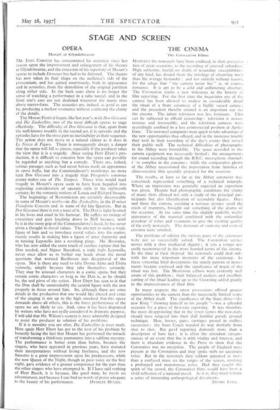OPERA
STAGE AND SCREEN
Mozart at Glyndebourne
Mn. JOHN CHRISTIE has concentrated his attention since last season upon the improvement and enlargement of his theatre at Glyndebourne, and the extension of his repertory of Mozart's operas to include Idomeneo has had to be deferred. The theatre has now taken its final shape on the audience's side of the proscenium, and has gained enormously, both in appearance and in acoustics, from the demolition of the original partition along either side. In the back seats there is no longer the sense of watching a performance in a tube tunnel, and in the front one's ears are not deafened whenever the music rises above mezzo-forte. The acoustics are, indeed, as good as can be, producing a mellow resonance without confusing the clarity of the details. .
The Mozart Festival began, like last year's, with Don Giovanni and Die Zauberflote, two of the most difficult operas to stage effectively. The difficulty Of Don Giovanni is that, apart from the well-known muddle in the second act, it is episodic and the episodes have for the most part no inevitability in their sequence. The action does not move to a natural climax as it does in Le Nozze di Figaro. There is consequently always a danger that the opera will fall to pieces, especially if the producer takes the view that it is a tragedy. After seeing Herr Ebert's pro- duction, it is difficult to conceive how the opera can possibly be regarded as anything but a comedy. There are, indeed, serious passages such as had never before made an appearance in opera buffa, but the Commendatore's trombones no more turn Don Giovanni into a tragedy than Prospero's sonorous poetry makes one of The Tempest. Those who would read tragedy in Mozart's opera seem to have been beguiled into neglecting consideration of operatic style in the eighteenth century, by the romantic notions of Lenau and Richard Strauss.
The beginnings a Romanticism are certainly discoverable in some of Mozart's works—in Die Zauberflote, in the D minor Pianoforte Concerto and in some of the late Quartets. But in Don Giovanni there is not a trace of it. The Dan is light-hearted in his loves and cruel in his humour. He suffers no twinge of conscience and goes laughing down to Hell because, until he is in the stony grip of the Commendatore's hand, he has never given a thought to moral values. The attempt to make a tragic figure of him and so introduce moral values into the matter, merely results in making him a figure of utter depravity and in turning Leporello into a revolting pimp. Mr. Brownlee, who has now added the extra touch of careless rapture that his Don needed, and Signor Baccaloni, a truly buffo Leporello, never once allow us to bother our heads about the moral questions that worried Beethoven into disapproval of the opera. Nor is there any need to take Donna Anna and Elvira seriously, simply because they take themselves seriously. They may be unusual characters in a comic opera, but they remain comic characters so long as the Don is, as he should be, the real pivot of the action. Herr Ebert has seen to it that the Don shall be unmistakably the central figure with the rest properly in focus around him. So, although there are some details in the production that one would like altered and some of the singing is not up to the high standard that this opera demands above all others, this is the finest performance of the opera we are likely to see. And, since it has been dispraised by writers who have not really considered its dramatic purpose, I will add that Mr. Wilson's scenery is most admirably designed to assist the producer in solution of his problems.
If it is morality you are after, Die Zauberflote is your mark. Here again Herr Ebert has got to the root of his problem by honestly facing the fact that Mozart has performed the miracle of transforming a third-rate pantomime into a sublime mystery. The performance is better even than before, because the singers, who have appeared in previous years, have matured their interpretations without losing freshness, and the new Sarastro is a great improvement upon his predecessors, while the new Queen of the Night, though in poor voice on the first night, gave evidence of a greater competence for the part than the other singers who have attempted it. If I have said nothing of Herr Busch, it is because, like good wine, he needs no advertisment, and because I can find no words of praise adequate to the beauty of his performance. DYNELEY HUSSEY.






































 Previous page
Previous page